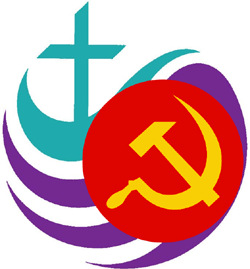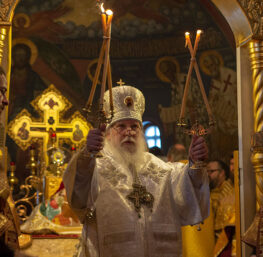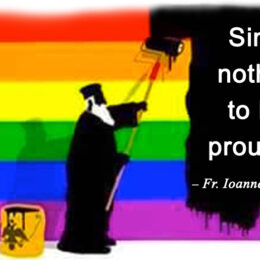
5/26/2010 – Faith McDonnell –
Conducting “truth commissions” to denounce American armed forces and organizing divestment campaigns to cripple Israel are vital issues to some American church officials. Raising the banner of Intifada and expressing solidarity with Palestinians are also very important to this collection of liberal leaders. They “spiritualize” the Democratic immigration and health care reform agendas with pompous prayer, but their social justice-focused prophetic vision has strange blind spots. Leftist church leaders hardly ever see, let alone condemn, the imprisonment, enslavement, torture, and murder of Christians in the Islamic world, North Korea, and China.
Church officials and partner organizations such as the National Council of Churches (NCC) and the World Council of Churches (WCC) issue strident policy statements on such topics as “eco-justice,” broadband access for “economically depressed rural areas,” the Israeli “occupation,” and “unnecessary Department of Defense spending.” But one is hard-pressed to find these church leaders denouncing the recent appointment of the Islamic Republic of Iran to the United Nations Commission on the Status of Women. One searches in vain for an expression of solidarity with the Christian community in Jos, Plateau State, in central Nigeria, where hundreds of Christians were slaughtered by Fulani jihadists during March and April of 2010. If there are any such statements, they address vaguely “ethnic conflict” and are masterpieces of moral equivalency.
Such reticence to speak about persecution is not new for liberal church leaders. Downplaying or denying the egregious human rights violations of the Soviet system was symptomatic of Leftist hatred of America and Western values. It was also considered essential to the type of appeasement of tyrants necessary to achieve the liberal Utopian dream of a peaceful, nuclear weapon-free world.
In the 1970’s, the NCC’s Friendship Press published two mission studies on China seemingly which would be welcome additions to the Anita Dunn library. In both of these so-called “mission studies,” Chinese Communism received preferential treatment and the efforts of early Christian missionaries were viewed with disapproval as imperialistic and unwelcome interventions.
The 1975 mission study, China: People-Questions, expresses no similar disapproval towards the horrific violence that took place during the Cultural Revolution. Instead, the book praises the Cultural Revolution for having “deepened and continued” the process of moving China to socialism by “unceremoniously” uprooting “mutant social growths.” The church mission study gushes, “In time the road of Mao and his followers clearly emerged as the one that humanized the social relations of the society.”
The other mission study was China: Search for Community, released to unsuspecting church members by the NCC in 1978. Included in this mission study is a retelling of the story of the Good Samaritan, casting all things Western and religious as the assorted villains of the piece. Imagine thousands of Sunday School members in mainline churches, receiving their only education about the People’s Republic of China from this story:
A country, a culture, was on its way through the centuries. It fell in with robbers, who stripped it, beat it, and left it at the roadside half dead. The robbers were many: graft and corruption, war lords and generalissimos, foreign powers, Western merchants and missionaries. And China was helpless. A priest passed by: Christian or a Buddhist…too concerned with religion to be willing to get his hands dirty with social reform and politics. . .
Finally the Samaritan arrived on the scene.… In Chinese eyes he could be no other than Mao Tse-tung and the Chinese Communist Party. The wounds made by the imperialist robbers were healed, national dignity restored, and armed protection was given. Here was the neighbor, the comrade…. Here was the one deserving the love of the people and setting the example for a life style and a political program.
Mao was not the only Marxist beloved by liberal church leaders. The religious left has had similar admiration for Fidel Castro while ignoring the oppression and persecution of Cuba’s Christians. One of Cuba’s most famous prisoners of conscience, Christian poet and patriot Armando Valladares, was imprisoned for 22 years. Soon after he was released, he was the recipient of The Institute on Religion and Democracy’s (IRD) 1983 Religious Freedom Award. In his moving acceptance speech, Valladares revealed the betrayal of prisoners such as himself by churches of the religious left:
The honor which you bestow upon me today will have special significance for Cuba’s political prisoners….During those years, with the purpose of forcing us to abandon our religious beliefs and demoralize us, the Cuban communist indoctrinators repeatedly used the statements of support for Castro’s revolution made by some representatives of American Christian churches. Every time that a pamphlet was published in the United States, every time a clergyman would write an article in support of Fidel Castro’s dictatorship, a translation would reach us and that was worse for the Christian political prisoners than the beatings or the hunger.
While we waited for the solidarity embrace from our brothers in Christ, incomprehensively to us, those who were embraced were our tormentors…. the Christians in Cuba’s prisons suffer not only the pain of torture and isolation but also the conviction that they have been deserted by their brothers in faith.
You might think that Valladares was exaggerating — surely national church leaders are not as naïve as those teenagers and aging hippies who sport icons of Che on their tee shirts? (Of course many church leaders are aging hippies.) But Contending for the Faith, the autobiography of Methodist reformer and evangelist the Rev. Dr. Ed Robb, shows otherwise. Robb tells of a typical church delegation’s visit to Cuba that took place while Armando Valladares “was languishing in a Cuban prison cell without clothes, books, Bible, pen, or paper” in 1977. He smuggled out poems written in his own blood. The delegation, led by then NCC head Bishop James Armstrong, was enamored with Valladares’ jailers, but not with those brave dissidents in Cuban prisons.
The members of the delegation made the following statement upon their return home: “There is significant difference between a situation where people are imprisoned for opposing regimes designed to perpetuate inequalities (as in Chile and Brazil, for example) and situations where people are imprisoned for opposing regimes designed to remove inequities (as in Cuba).” (Armstrong and Dilly, A Report from Cuba, United Methodist Church of the Dakotas Area, June 1977) Regimes designed to “remove inequities” have always been in favor with the religious left, and continue to be so today, even closer to home than Cuba!
The cries of oppressed and persecuted Christians in the former Soviet Union were likewise dismissed by religious left church leaders obsessed with the dream of nuclear disarmament. The World and National Councils of Churches routinely ignored thousands of brave believers from Russia, Ukraine, Latvia, Lithuania, Czechoslovakia, Hungary, East Germany, Poland, and elsewhere, while fawning over KGB-groomed Russian Orthodox clergy participating in the World Council of Churches (WCC). In 1983 at the Sixth Assembly of the World Council of Churches held in Vancouver, The IRD reported that in deference to the Soviet bloc delegates “The WCC again refused to make any public statement on behalf of the millions of persecuted Christians living under the Soviet empire. Appeals by imprisoned believers were spiked on the grounds that they did not come from member churches of the WCC.”
One exception to this gag rule was the then Archbishop of Canterbury, former Scots Guard and heroic tank commander, Lord Robert Runcie. Runcie had received a plea for help from Vladimir Rusak, a deacon of the Russian Orthodox Church. Fr. Rusak had been fired from his job in the editorial offices of the Moscow Patriarchate Journal for writing a history of the post-Revolution Russian Church exposing the church’s compromises and collaborations with the Soviets. When Rusak refused to recant he was moved back to Moscow. He was working as a road sweeper to avoid arrest on charges of “parasitism” at the time.
Runcie read Rusak’s letter to the Assembly and even shared it in a press conference and BBC radio broadcast. But the WCC took no action. Their agenda that year was the “nuclear threat and neo-colonialism” that “glowered like dark clouds on the horizon.” They wanted no messy confrontations over Rusak that would impede their progress discussing nuclear disarmament with the Russian Orthodox delegates (some later revealed to be KGB agents). So it was not surprising that two years later Rusak was arrested and sentenced to a combined labor camp/exile sentence of twelve years. An international outcry led to his release in 1988, but the outcry did not come from the religious left, still shrilling over nuclear threats.
The religious left believed that friendship with the Soviets would eventually fulfill its prophetic vision of a no-nuke world. But in order to swallow their own Utopian myth, they could not/would not acknowledge the suffering and oppression of Christians and others whose very lives testified to the contradictions and inconsistencies of the Workers Paradise. A few years later, in 1993, then NCC General Secretary Joan Brown Campbell admitted to the Washington Times, “We did not understand the depth of the suffering of Christians under communism. We failed to…cry out under the communist oppression.”
Campbell and her cohorts’ desire for Utopia blinded them to the history-making fusion of religious dissidents and freedom lovers. That fusion caused the Soviet Union to implode, doing far more to prevent nuclear war than merely appeasing the tormentors ever did.
Today, denying the torment of those who long for freedom and religious liberty is an essential component of American foreign policy that appears to be supported by the religious left. The Obama Administration and liberal church leaders embrace and bow to tormentors hostile to America and freedom in the vain hopes of preventing terrorism and war. But there are still brave men and women whose lives and deaths testify to the deception of that Utopian view. And there is still hope that their fusion of faith and freedom growing around the world will cause another implosion.
Read the entire article on the Institute for Religion and Democracy site.



